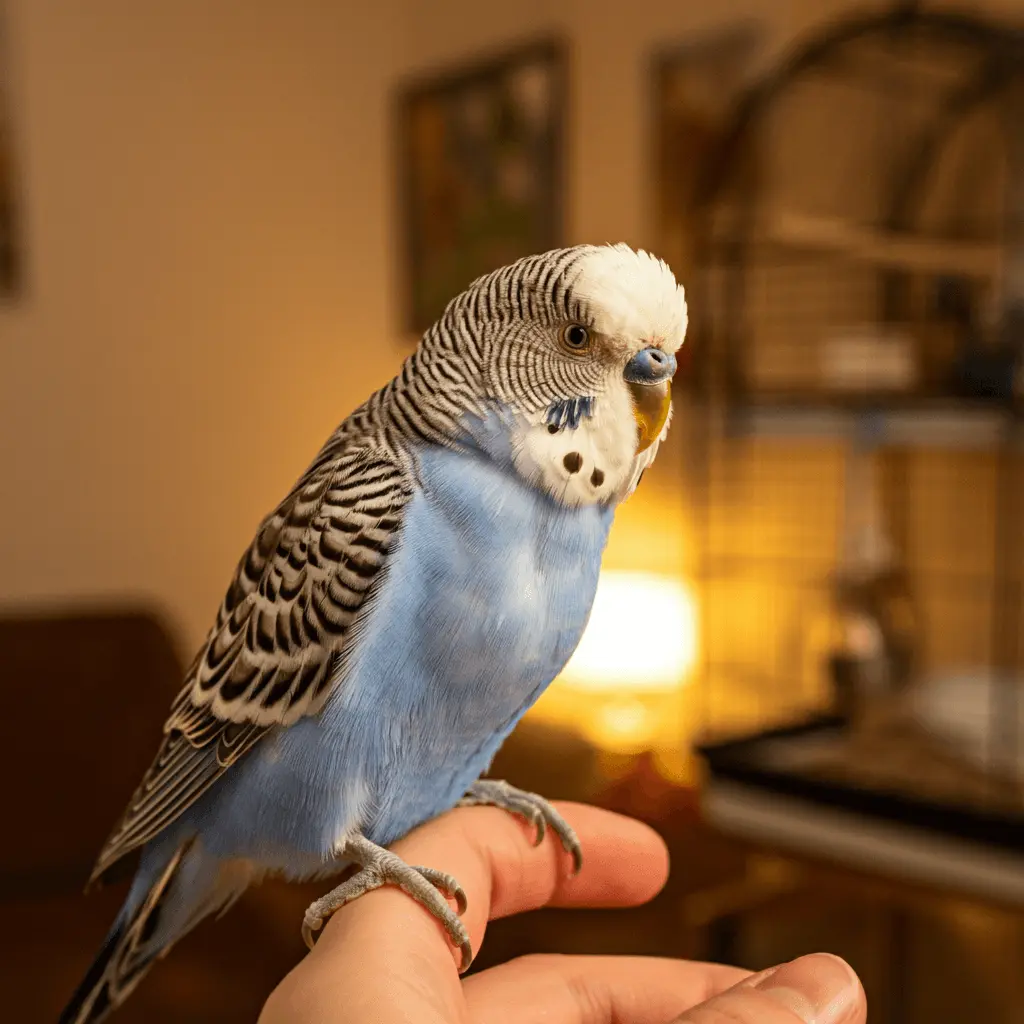Understanding Budgerigar Aggressive Behavior
Budgerigar aggressive behavior can be concerning for any bird owner, especially when your typically gentle budgie suddenly turns aggressive. Understanding what causes this change in behavior is the first step in addressing it effectively.
Budgies, like other birds, can exhibit aggression for various reasons. Sometimes, it’s a result of feeling threatened or stressed. Other times, it might be due to territorial instincts, especially if they feel their space is being invaded. It’s also not uncommon for budgies to become aggressive if they are in pain or discomfort.
Recognizing the signs of aggression is crucial. Budgies might bite, fluff up their feathers, or hiss when they feel threatened. These behaviors can escalate if the underlying cause isn’t addressed. For instance, if your budgie is biting more frequently, it could be a sign of territorial behavior or simply a reaction to something in its environment.
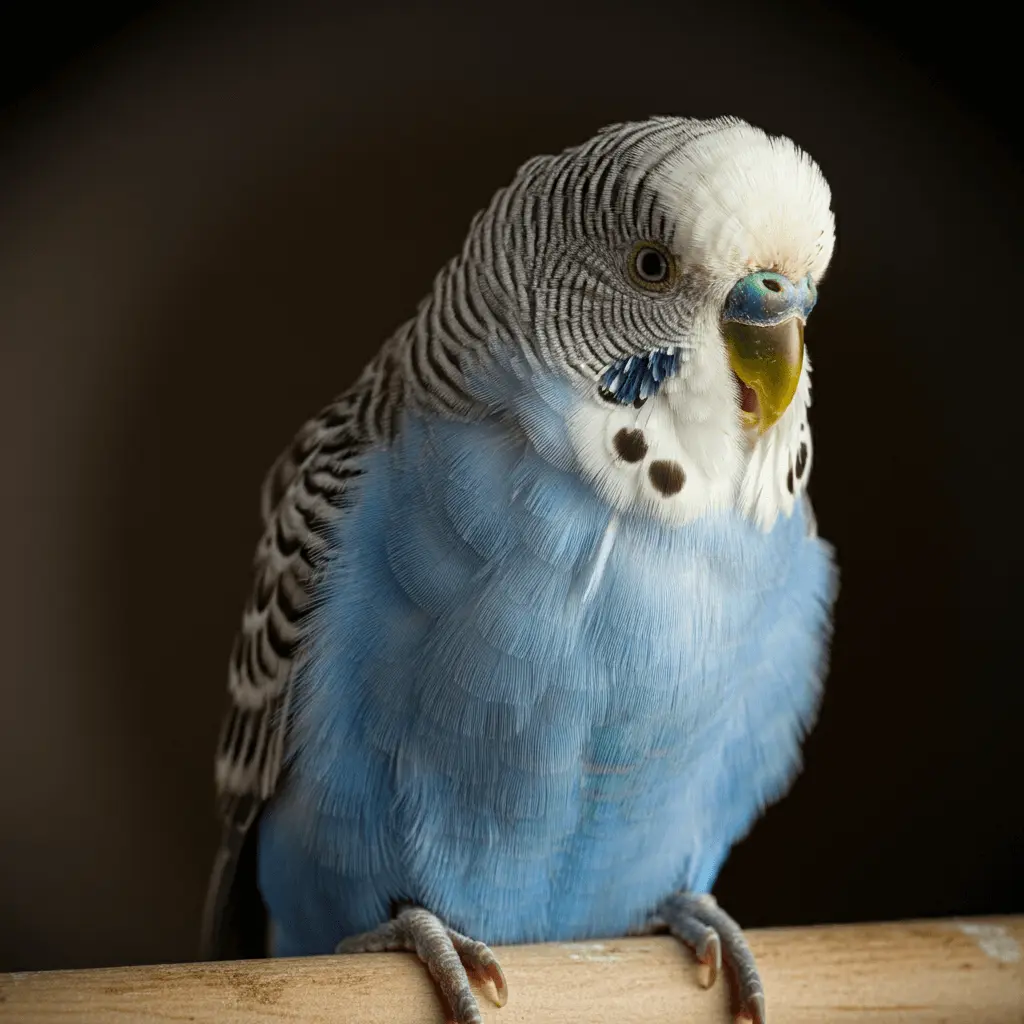
A close-up shot of a budgerigar hissing, a common sign of aggression in budgies. Understanding these signs can help in managing and reducing aggressive behavior.
Stress is another significant factor. Changes in their environment, such as moving their cage or introducing a new bird, can trigger stress-induced aggression. Understanding that this behavior is often a response to stress or fear can help you approach the situation with more empathy.
Aggression in budgerigars can also stem from boredom. Without enough stimulation, a budgie may become frustrated and act out. Ensuring your budgie has enough toys and interaction can prevent these issues from arising.
In some cases, aggressive behavior might be due to hormonal changes, especially during breeding season. This is a natural response, but it can be managed with the right care and environment adjustments.
Understanding your budgie’s aggressive behavior is the key to managing it. By identifying the root cause, whether it’s stress, territorial instincts, or boredom, you can take steps to create a more peaceful environment for your bird. Remember, addressing these issues early on can prevent the behavior from becoming a long-term problem.
Common Causes of Aggressive Behavior in Budgerigars
Understanding the common causes of aggressive behavior in budgerigars is essential for any bird owner looking to maintain a peaceful environment for their feathered friend. Budgerigars, or budgies, are usually friendly and sociable birds, but various factors can lead to aggression, making it crucial to pinpoint the cause.
One of the most common triggers of budgerigar aggressive behavior is territoriality. Budgies are naturally protective of their space, especially their cage. If they feel that their territory is being invaded—whether by another bird or a human—they might react aggressively. This territorial behavior is even more pronounced during the breeding season when budgies become more protective of their nesting areas.
Stress is another significant cause of aggression in budgies. Changes in their environment, such as moving to a new home, rearranging their cage, or introducing new pets or people, can stress them out. A stressed budgie may start biting or acting out in ways that seem aggressive. This behavior is often a defensive response, as your budgie tries to cope with the new situation.
Lack of stimulation is also a major factor. Budgies are intelligent and active birds that need plenty of mental and physical stimulation. Without enough toys, interaction, and activities, they can become bored and frustrated. This frustration can manifest as aggressive behavior, such as biting or excessive squawking.
Health issues can’t be overlooked either. A budgie in pain or discomfort might display aggression as a way to protect itself. If your usually calm budgie suddenly becomes aggressive, it’s essential to check for signs of illness or injury. Regular vet check-ups can help catch these issues early and prevent aggression linked to health problems.
Hormonal changes during breeding season can also lead to aggression. Budgies may become more irritable and protective, especially males. This is a natural part of their behavior cycle but can be managed with proper care and understanding.
By understanding these common causes of aggressive behavior in budgerigars, you can take steps to address and prevent it. Whether it’s by providing a stable environment, ensuring plenty of stimulation, or monitoring their health, these actions will help create a calm and happy home for your budgie.
How to Identify Signs of Aggression in Your Budgerigar
Recognizing the signs of aggression in your budgerigar is crucial for addressing and managing their behavior effectively. Budgerigars may not always be vocal about their discomfort, so understanding their body language and actions is key to identifying when they’re feeling aggressive.
One of the most obvious signs of budgerigar aggressive behavior is biting. If your budgie starts nipping at your fingers or other birds, it’s a clear indication that something is bothering them. Biting can range from a gentle nip to a more forceful bite, depending on the level of aggression. It’s essential to pay attention to this behavior, as it often signals that your budgie feels threatened or stressed.
Another common sign of aggression is feather fluffing. When a budgie fluffs up its feathers, it’s often trying to appear larger and more intimidating. This is a defensive posture, and if your budgie is consistently puffing up around certain situations or individuals, it could be a sign of aggression.
Hissing or making sharp, repetitive sounds is also a telltale sign of an aggressive budgie. This vocalization is a warning signal, letting you know that your budgie is uncomfortable or upset. If you hear hissing, it’s best to give your budgie some space and identify what might be causing their distress.
Budgies may also exhibit territorial behavior by guarding their cage or a specific spot in their environment. They might chase other birds away or become defensive if you try to interact with them in these areas. This behavior is particularly noticeable during the breeding season, when budgies can become more protective of their nesting spaces.
Another subtle sign of aggression is eye pinning, where the pupils of your budgie’s eyes rapidly constrict and dilate. This can happen when they are excited, but it’s also a sign of agitation and aggression, especially when combined with other aggressive behaviors like biting or hissing.
Lunging is another sign to watch out for. If your budgie suddenly lunges at you or another bird, it’s a clear indication of aggression. This action is usually meant to scare off the perceived threat and should be taken seriously.
By closely observing these behaviors, you can quickly identify when your budgerigar is feeling aggressive. Early detection allows you to take steps to calm your bird and address the root cause of their aggression, ensuring a more peaceful environment for everyone involved.
Effective Strategies to Calm an Aggressive Budgerigar
Dealing with budgerigar aggressive behavior can be challenging, but with the right strategies, you can help your bird feel more at ease and reduce their aggression. Here are some effective techniques to calm an aggressive budgerigar and create a more peaceful environment for both you and your pet.
1. Give Your Budgie Space
One of the most immediate ways to calm an aggressive budgie is to give them space. If your budgie is acting out, it might be because they feel threatened or overwhelmed. Allow them some time alone in their cage to relax. Avoid handling or approaching them until they seem calmer. This will help reduce their stress and give them a chance to cool down.
2. Identify and Remove Stressors
Budgies can become aggressive when they are stressed by changes in their environment. Look for anything that might be causing your budgie stress, such as a new pet, loud noises, or rearranged furniture. Once identified, try to remove or minimize these stressors. Sometimes, simply moving their cage to a quieter location can make a big difference in their behavior.
3. Create a Consistent Routine
Budgerigars thrive on routine. Establishing a consistent daily schedule for feeding, playtime, and rest can help reduce anxiety and aggression. When your budgie knows what to expect, they are less likely to feel threatened or stressed, which can help reduce aggressive behavior.
4. Offer Mental and Physical Stimulation
Boredom is a common cause of aggression in budgies. Providing your budgie with a variety of toys, perches, and activities can keep them mentally and physically engaged, reducing their frustration. Rotate toys regularly to keep things fresh and interesting for your bird. Interactive toys, like foraging puzzles, can be particularly effective in keeping your budgie entertained and less prone to aggression.
5. Use Positive Reinforcement
Positive reinforcement is a powerful tool in training and calming an aggressive budgerigar. Reward your budgie with treats and praise when they display calm and non-aggressive behavior. This helps them associate good behavior with positive outcomes, encouraging them to be less aggressive over time. Be patient and consistent with your rewards to see the best results.
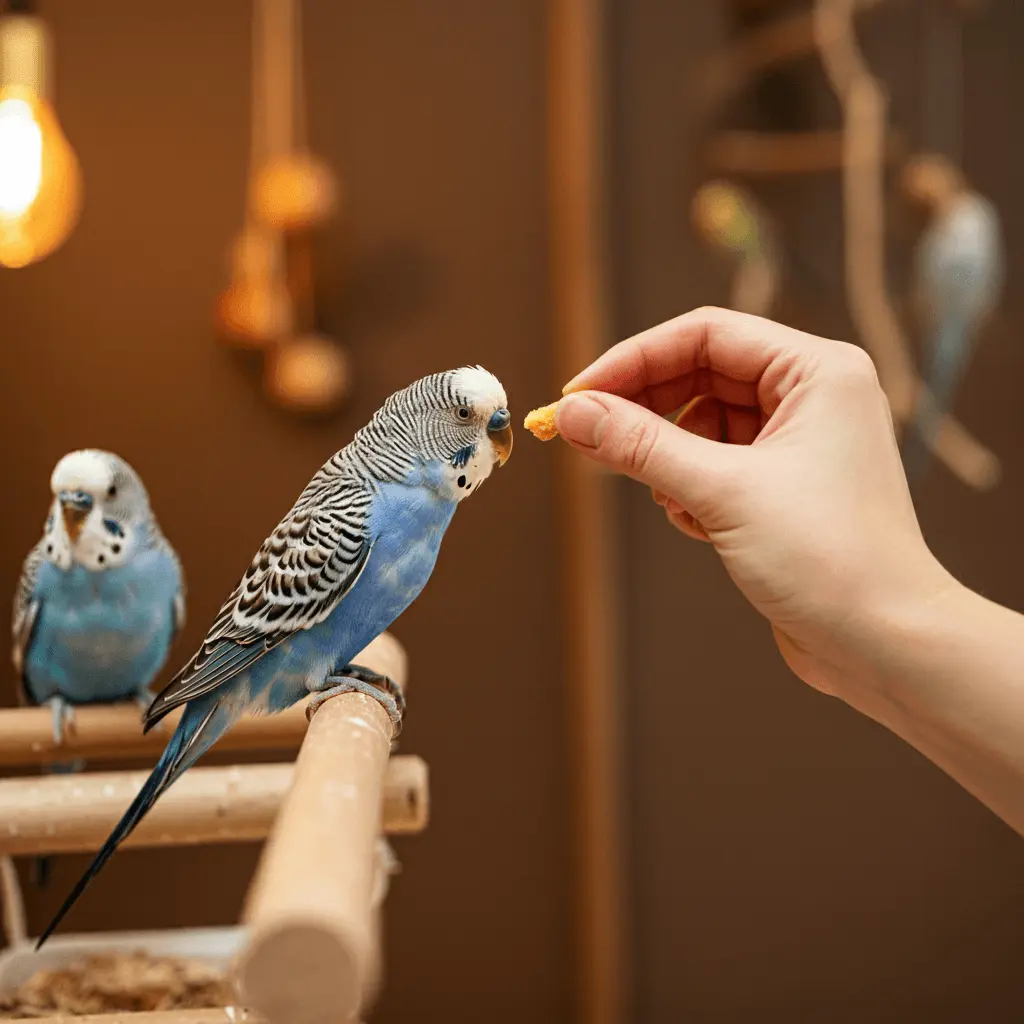
Offering treats is a positive reinforcement method used to train budgerigars and reduce aggressive tendencies. This image demonstrates the interaction between a budgie and its owner during a training session.
6. Handle with Care and Patience
When handling an aggressive budgie, it’s important to be gentle and patient. Avoid sudden movements or loud noises that might startle them. If your budgie bites or lunges, try not to react strongly, as this can reinforce their aggressive behavior. Instead, calmly place them back in their cage and give them time to settle down before trying again.
7. Consider Environmental Enrichment
Adding elements to your budgie’s environment that mimic their natural habitat can help reduce stress and aggression. Consider placing natural branches, plants, or safe, bird-friendly materials in their cage. These can provide comfort and a sense of security, which can help calm an aggressive budgie.
8. Monitor Health and Comfort
Sometimes, aggression in budgies can be a sign of underlying health issues. Regular vet check-ups are essential to ensure that your budgie is in good health. Additionally, make sure their cage is comfortable and appropriately sized, with fresh food and water always available. A healthy, comfortable budgie is less likely to exhibit aggressive behavior.
By applying these strategies, you can help your budgerigar feel more secure and reduce their aggression. Remember, patience and consistency are key when working with an aggressive budgie. Over time, these efforts will lead to a happier, calmer bird that is easier to handle and enjoy.
Environmental Factors That Can Influence Budgerigar Behavior
The environment in which your budgerigar lives plays a crucial role in shaping their behavior. Budgerigars are highly sensitive to their surroundings, and various environmental factors can either contribute to a calm and content bird or trigger aggressive behavior. Understanding these factors can help you create an ideal living space for your budgie, reducing the chances of budgerigar aggressive behavior.
1. Cage Placement
Where you place your budgie’s cage can significantly impact their mood and behavior. Budgies prefer to be in a spot where they feel safe and secure, with a good view of their surroundings but not in direct traffic areas. Placing the cage in a quiet corner where your budgie can observe but not be overwhelmed by constant activity can help reduce stress and aggression. Avoid placing the cage in front of windows with heavy traffic or near loud appliances, as these can make your budgie feel anxious.
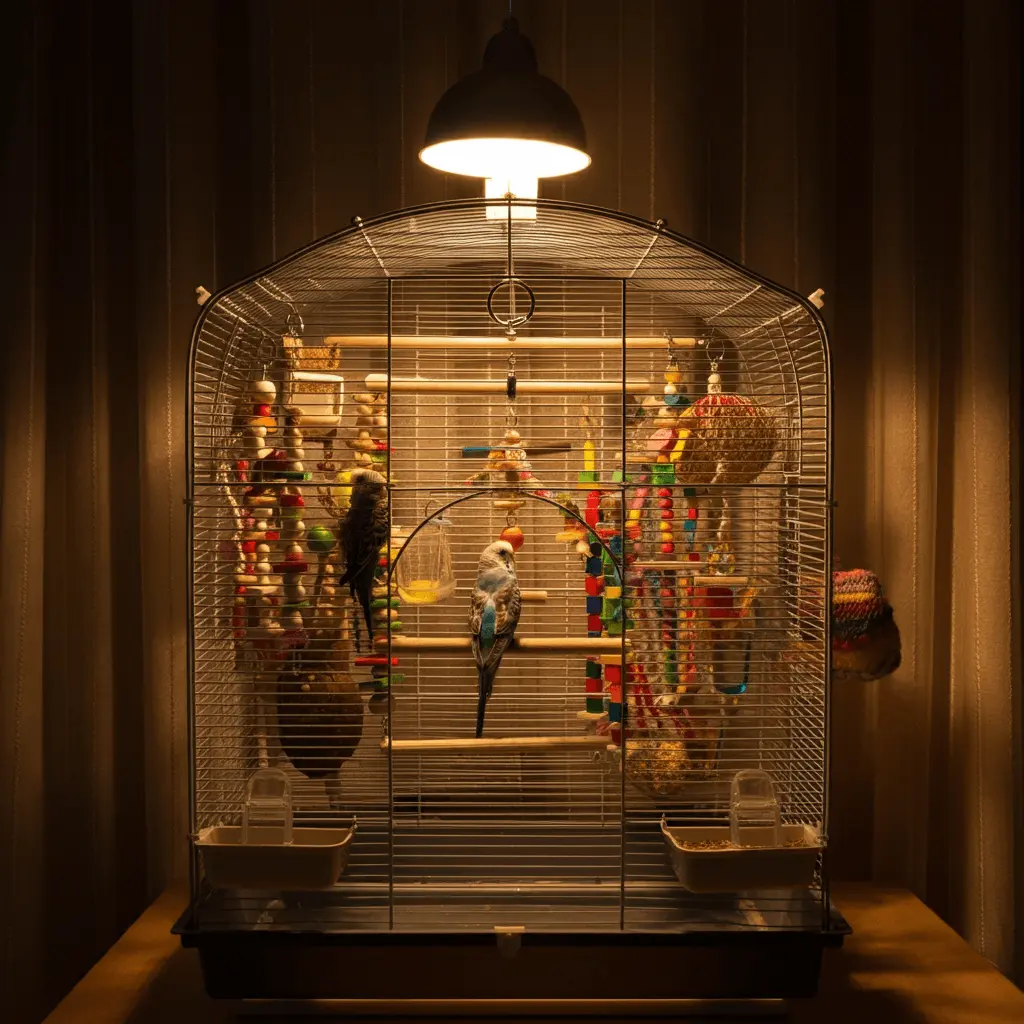
A well-lit and enriched cage environment can help reduce stress and aggression in budgerigars. This image showcases an ideal setup with toys and proper lighting.
2. Lighting Conditions
Lighting is another important factor that influences budgerigar behavior. Budgies need a consistent day-night cycle to regulate their biological clocks. Too much artificial light, especially at night, can disrupt their sleep and lead to stress and irritability. Ensure your budgie’s cage is in a spot where they can experience natural light during the day and darkness at night. If natural light is limited, consider using a full-spectrum bird light during the day to mimic natural sunlight.
3. Temperature and Humidity
Budgerigars are native to warm climates, so keeping the temperature in their environment stable is essential. Sudden changes in temperature or drafts can make your budgie uncomfortable and more prone to aggressive behavior. Ideally, the room where your budgie is kept should be between 70-75°F (21-24°C). Humidity levels should also be monitored; too low or too high humidity can affect your budgie’s health and mood. Maintaining a stable, comfortable temperature and humidity level will help keep your budgie happy and calm.
4. Noise Levels
Budgerigars are social creatures, but they can be sensitive to loud, sudden noises. High noise levels can cause stress and lead to aggressive behavior. It’s important to keep your budgie in an area where noise levels are moderate. Background music or gentle sounds can be comforting, but avoid placing the cage near televisions, speakers, or areas with frequent loud conversations.
5. Cage Size and Setup
The size of your budgie’s cage and how it is set up can also influence their behavior. A cramped, poorly organized cage can lead to frustration and aggression. Make sure the cage is spacious enough for your budgie to move around comfortably and includes a variety of perches, toys, and feeding stations to keep them stimulated. Regularly changing the layout and adding new toys can also prevent boredom and reduce aggressive tendencies.
6. Social Interaction
Budgerigars are highly social birds, and their interaction with you and other birds can affect their behavior. Lack of socialization can lead to loneliness and aggression. Spend quality time with your budgie daily, talking to them, playing with them, or simply being near their cage. If you have more than one budgie, ensure they get along well and that their personalities are compatible, as this will promote a harmonious environment.
7. Diet and Nutrition
What your budgie eats can also impact their behavior. A poor diet can lead to nutritional deficiencies, making your budgie irritable and more prone to aggressive behavior. Ensure your budgie is getting a balanced diet that includes seeds, fresh fruits, and vegetables. Providing a variety of foods will not only keep your budgie healthy but also mentally stimulated.
By paying attention to these environmental factors, you can create a space that supports your budgie’s well-being and minimizes aggressive behavior. A well-adjusted environment leads to a happier, more relaxed bird, which in turn makes for a more enjoyable and peaceful relationship between you and your feathered friend.
How to Prevent Aggressive Behavior in Budgerigars
Preventing aggressive behavior in budgerigars is easier than dealing with it once it’s already a problem. By taking proactive steps, you can create an environment and routine that fosters positive behavior and keeps your budgie calm and happy. Here are some effective strategies to help you prevent budgerigar aggressive behavior.
1. Establish a Consistent Routine
Budgerigars thrive on routine. A consistent daily schedule helps your budgie feel secure and reduces the likelihood of aggression. Set regular times for feeding, play, and rest, and stick to them as closely as possible. This predictability helps minimize stress and keeps your budgie in a positive mood.
2. Provide Adequate Stimulation
Boredom is a common trigger for aggression in budgies. Make sure your budgie has plenty of toys and activities to keep them mentally and physically engaged. Rotate toys regularly to keep things fresh and interesting. Interactive toys, such as foraging puzzles, can be particularly effective in preventing frustration that could lead to aggressive behavior.
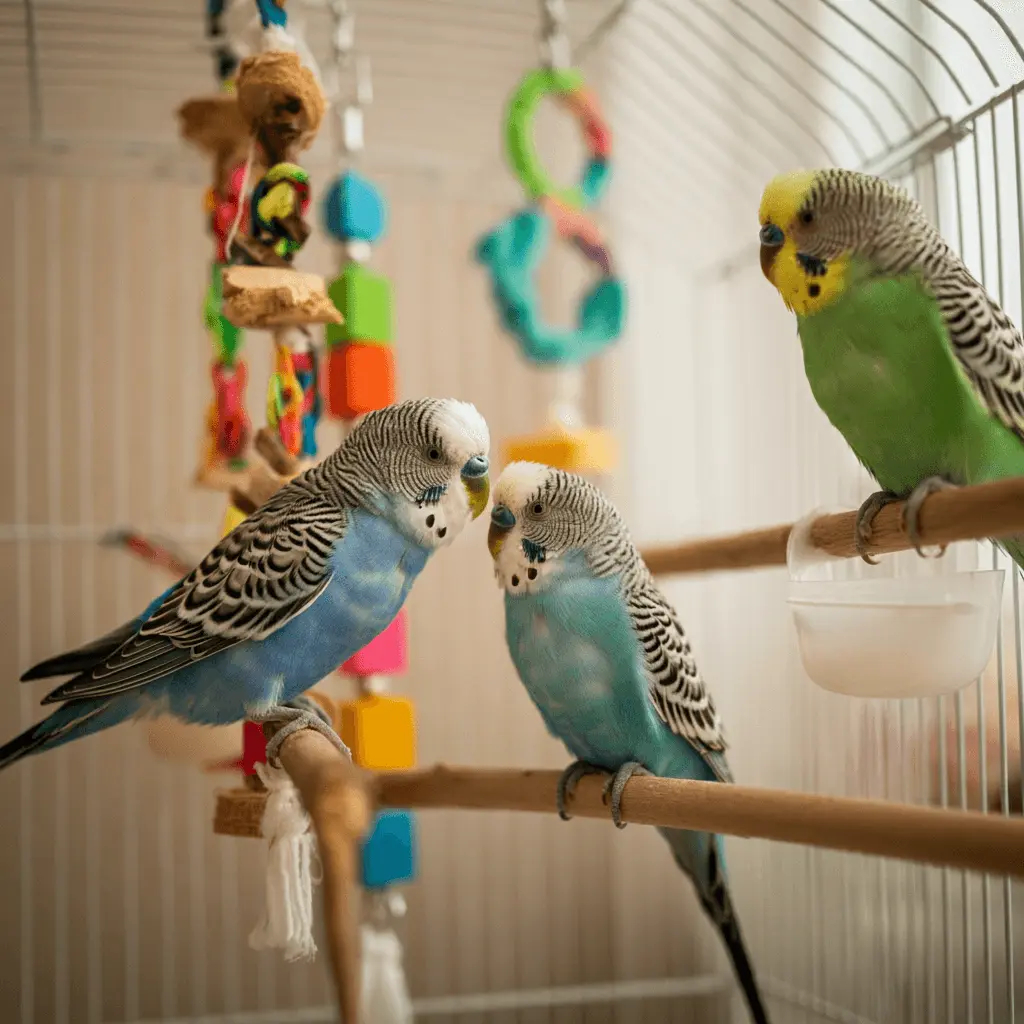
Interaction with toys and social engagement among budgerigars can help in preventing aggressive behavior. This image shows three budgies in a cage interacting with each other and their toys.
3. Socialize Your Budgie
Budgerigars are social creatures that need regular interaction to stay happy. Spend time with your budgie every day, whether it’s talking to them, playing, or simply being near their cage. If you have more than one budgie, ensure they have opportunities to bond and interact positively with each other. Proper socialization reduces feelings of loneliness and the likelihood of aggression.
4. Ensure a Comfortable Environment
The environment plays a significant role in your budgie’s behavior. Make sure their cage is spacious, clean, and equipped with perches, toys, and a variety of food stations. Keep the cage in a quiet, stable area of your home where your budgie feels safe but still connected to the household’s activity. Avoid sudden changes in temperature, lighting, or noise levels, as these can stress your budgie and lead to aggression.
5. Handle with Care
When handling your budgie, always be gentle and patient. Avoid sudden movements that might startle them, and never force interaction if your budgie seems uncomfortable. Gradual, positive interactions help build trust and prevent fear-based aggression. Remember, a calm and confident approach will help your budgie feel more secure.
6. Monitor Health Regularly
A healthy budgie is a happy budgie. Regular health check-ups can prevent health issues that might contribute to aggressive behavior. Ensure your budgie’s diet is balanced and includes a mix of seeds, fruits, and vegetables. Nutritional deficiencies can lead to irritability and aggression, so providing a varied and healthy diet is crucial.
7. Introduce Changes Gradually
Budgerigars can be sensitive to changes in their environment or routine. If you need to make changes, such as moving their cage or introducing a new bird, do so gradually. Give your budgie time to adjust to the new situation to prevent stress-induced aggression. Slow, steady introductions help your budgie feel safe and reduce the likelihood of negative reactions.
8. Positive Reinforcement
Reinforce good behavior with praise and treats. When your budgie is calm and well-behaved, reward them with their favorite snack or a kind word. Positive reinforcement helps your budgie associate good behavior with positive outcomes, making them more likely to remain calm and friendly.
By implementing these strategies, you can prevent aggressive behavior in your budgerigar and ensure a peaceful, happy relationship with your feathered friend. Remember, consistency, patience, and understanding are key to fostering a calm and content budgie. With the right care and environment, you can help your budgie thrive and minimize the chances of aggression.
When to Seek Professional Help for Your Budgerigar
While most cases of budgerigar aggressive behavior can be managed with patience and the right strategies, there are times when seeking professional help is necessary. Understanding when to consult an avian veterinarian or a bird behavior specialist can make a significant difference in your budgie’s well-being.
1. Persistent Aggression Despite Efforts
If your budgie continues to exhibit aggressive behavior despite your best efforts to calm and manage them, it may be time to seek professional help. Persistent aggression can indicate underlying issues that require expert intervention. A professional can provide a thorough assessment and offer solutions that you might not have considered.
2. Signs of Illness or Injury
Aggression in budgerigars can sometimes be a sign of illness or injury. If your budgie’s behavior changes suddenly or if they show other signs of distress—such as lethargy, loss of appetite, or changes in droppings—it’s crucial to consult an avian veterinarian immediately. Health issues can lead to pain and discomfort, which often manifest as aggression.
3. Behavioral Changes After Environmental Adjustments
If you’ve recently made changes to your budgie’s environment—such as moving their cage, introducing a new bird, or altering their routine—and you notice a significant increase in aggression, professional advice can help. A bird behavior specialist can guide you on how to manage these changes and help your budgie adjust without escalating their aggressive behavior.
4. Difficulty in Handling or Bonding
Sometimes, despite your best efforts, you may find it challenging to handle or bond with your budgie due to their aggression. If you feel that your relationship with your budgie is strained or if you’re struggling to interact with them safely, a professional can offer training tips and techniques to improve your bond and reduce aggression.
5. Aggression Towards Other Birds
If your budgie is aggressive towards other birds in your home, it’s important to address the issue promptly to prevent injury. A professional can help you assess the dynamics between your birds and provide strategies to reduce tension and promote harmony. In some cases, they may recommend changes in how you house or interact with your birds to prevent further aggression.
6. Unusual or Severe Aggression
If your budgie exhibits unusual or severe aggressive behavior—such as unprovoked attacks, extreme territoriality, or continuous biting—it’s time to seek professional help. Such behaviors can be dangerous for both your budgie and others in your household. An avian expert can evaluate your budgie’s behavior and determine if there are deeper psychological or environmental factors at play.
7. Concerns About Your Budgie’s Well-Being
As a pet owner, you know your budgie better than anyone else. If you have concerns about their well-being, whether related to their behavior or overall health, don’t hesitate to seek professional advice. It’s always better to address potential issues early on rather than wait until they become more serious.
Seeking professional help for your budgerigar is a proactive step in ensuring their health and happiness. Whether it’s a health concern or a behavioral issue, avian veterinarians and bird behavior specialists are trained to help you and your budgie overcome challenges. Remember, your budgie’s well-being is paramount, and expert guidance can make all the difference in creating a peaceful, happy environment for your feathered friend.
FAQs About Budgerigar Aggressive Behavior
When it comes to understanding and managing budgerigar aggressive behavior, many bird owners have questions. Here are some of the most frequently asked questions to help you better understand your budgie and how to handle their aggression.
1. Why is my budgie suddenly aggressive?
Sudden aggression in a budgie can be caused by various factors, including stress, changes in their environment, or health issues. It’s important to observe any recent changes in their surroundings or behavior to identify the cause. If the aggression persists, consider consulting an avian veterinarian to rule out any underlying health problems.
2. How can I stop my budgie from biting?
To stop a budgie from biting, start by identifying what’s triggering the behavior. It could be fear, territorial instincts, or frustration. Provide plenty of toys and interaction to keep them engaged, and use positive reinforcement when they behave calmly. Avoid reacting strongly to bites, as this can reinforce the behavior. Instead, calmly place them back in their cage and give them time to settle down.
3. Is it normal for budgies to be territorial?
Yes, it’s normal for budgies to exhibit territorial behavior, especially during breeding season or when they feel their space is being invaded. To reduce territorial aggression, ensure your budgie’s cage is spacious and provide multiple perches and feeding stations to minimize competition for resources.
4. Can diet affect my budgie’s behavior?
Absolutely. A balanced diet is essential for your budgie’s overall health and behavior. Nutritional deficiencies can lead to irritability and aggression. Make sure your budgie is getting a varied diet that includes seeds, fresh fruits, and vegetables to support their mental and physical well-being.
5. Should I separate my budgies if they are fighting?
If your budgies are fighting aggressively, it’s often best to separate them temporarily to prevent injury. Place them in separate cages where they can still see and hear each other, and gradually reintroduce them once they have calmed down. If fighting persists, you may need to consult a bird behavior specialist for further advice.
6. How can I tell if my budgie’s aggression is due to illness?
Aggression linked to illness is often accompanied by other signs, such as changes in appetite, lethargy, or unusual droppings. If your budgie’s aggressive behavior is sudden and accompanied by any of these symptoms, it’s important to seek veterinary care immediately to address any potential health issues.
7. Is it possible to train an aggressive budgie to be friendly?
Yes, with patience and consistency, you can train an aggressive budgie to be friendlier. Focus on positive reinforcement by rewarding calm behavior with treats and praise. Gradually increase your interaction with your budgie, using gentle handling techniques to build trust. Over time, your budgie can learn to associate you with positive experiences and become less aggressive.
8. Can changes in the environment cause my budgie to become aggressive?
Yes, changes in the environment, such as moving their cage, introducing new pets, or even altering their routine, can cause stress and lead to aggression in budgies. Try to make changes gradually and give your budgie time to adjust. Maintaining a consistent environment and routine will help reduce stress and prevent aggressive behavior.
9. What should I do if my budgie hisses at me?
Hissing is a sign that your budgie is feeling threatened or upset. If your budgie hisses at you, give them some space and avoid forcing interaction. Try to identify what’s causing their discomfort and address it. Once your budgie feels safe again, you can gradually rebuild trust through gentle, positive interactions.
10. When should I seek professional help for my budgie’s aggression?
If your budgie’s aggression is persistent despite your efforts to manage it, or if you notice any signs of illness or injury, it’s time to seek professional help. An avian veterinarian or bird behavior specialist can provide expert advice and help you address the underlying causes of your budgie’s aggression.
These FAQs cover the most common concerns about budgerigar aggressive behavior. By understanding your budgie’s needs and taking proactive steps, you can create a harmonious environment that reduces aggression and promotes a happy, healthy relationship with your bird.
Conclusion: Helping Your Budgerigar Thrive in a Peaceful Environment
Creating a peaceful environment where your budgerigar can thrive is essential for preventing and managing aggressive behavior. By understanding the root causes of budgerigar aggressive behavior and implementing proactive strategies, you can foster a calm and happy home for your feathered friend.
Start by providing a stable and consistent routine that helps your budgie feel secure. Ensure their environment is comfortable, with a spacious cage, appropriate lighting, and minimal stressors. Engage your budgie with plenty of mental and physical stimulation through toys, social interaction, and a balanced diet. Remember, positive reinforcement goes a long way in encouraging good behavior and building trust.
When challenges arise, such as sudden aggression or persistent behavioral issues, don’t hesitate to seek professional help. Whether it’s a health concern or a need for specialized behavioral training, expert guidance can make all the difference in ensuring your budgie’s well-being.
Ultimately, the key to helping your budgerigar thrive is patience, consistency, and a deep understanding of their needs. By creating a nurturing environment and addressing issues early, you can enjoy a peaceful and rewarding relationship with your budgie, where both of you can flourish in harmony.

